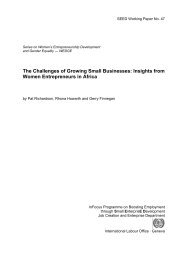manual: women workers' rights and gender equality - International ...
manual: women workers' rights and gender equality - International ...
manual: women workers' rights and gender equality - International ...
You also want an ePaper? Increase the reach of your titles
YUMPU automatically turns print PDFs into web optimized ePapers that Google loves.
‘I see, you come home for lunch?’<br />
‘No she brings it to the field’<br />
‘And after that?’<br />
‘She stays at the field do some weeding <strong>and</strong> waters the vegetables if necessary’<br />
‘What do you do?’<br />
‘I must go <strong>and</strong> discuss things <strong>and</strong> have a drink in the village’<br />
‘And after that?’<br />
‘I go home to have dinner that my wife prepared’<br />
‘Does she go to bed after dinner?’<br />
No, I do, I have to work again the next day, she cleans the dishes <strong>and</strong> takes care of the<br />
children’<br />
With a wondering voice: ‘But I thought you said your wife does not work’<br />
A bit irritated: ‘No, of course she does not work, I told you she stays at home’<br />
• Start a discussion about the value attached to certain activities using the following questions:<br />
- What do they think of the story, is this a common situation?<br />
- Do people get a higher status, i.e. are they more important, when they are involved in paid activities,<br />
why or why not?<br />
- Do the participants think this is fair, why or why not?<br />
- What can be done to get more recognition for household activities?<br />
- What do they think of the division of work as it is?<br />
- Would they like to change something? If yes, what <strong>and</strong> how do they plan to do it.<br />
Step 4<br />
• Summarize the discussion. Most probably the man does most of the income-generating<br />
activities. Make clear that household activities are often not rewarded, nor in terms of income<br />
neither in terms of appreciation. It should be clear that it is a lot of work <strong>and</strong> actually a money<br />
value can be attached to it.<br />
Notes for the trainer<br />
In most societies the activities that generate income are mostly done by men <strong>and</strong> the household<br />
tasks <strong>and</strong> unpaid family labour are done by <strong>women</strong>. In Asia, many <strong>women</strong> work for money to fulfil<br />
the basic needs of the family. However, even if <strong>women</strong> earn as much or more than their husb<strong>and</strong>s,<br />
their income is considered to be of secondary importance. In many societies the paid <strong>and</strong> the<br />
unpaid work done by <strong>women</strong> is considered to be less important. In practice, however, this is not<br />
true.<br />
It is important to discuss the actual value of <strong>women</strong>’s work. During this session it is very important<br />
to stress that the economic value of unpaid activities is very high. If <strong>women</strong> would get paid for this<br />
work, it would be very costly. Therefore more recognition for these activities is appropriate.<br />
The story expresses a common thought about the activities done by <strong>women</strong> <strong>and</strong> the value attached<br />
to these activities. It is a good starter for discussions about the division of work <strong>and</strong> the values<br />
attached to it.<br />
38

















